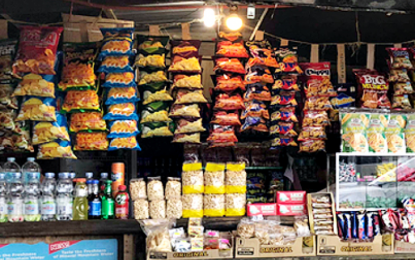
File photo
MANILA – The plan to impose taxes on junk food and sweetened beverages next year would provide more funding for the Universal Health Care (UHC) program.
The tax measure would be able to generate revenues to help realize “the objectives of the Universal Health Care Act to promote the Filipinos’ right to health, equitable access to quality and affordable health care, and healthy living conditions," according to a news release from Anakalusugan Party-list Representative Ray Reyes on Friday.
Finance Secretary Benjamin Diokno earlier said the Department of Finance (DOF) and the Department of Health (DOH) "are jointly pursuing a junk food and sweetened beverage tax as a proactive measure to tackle diabetes, obesity and non-communicable diseases related to poor diet."
Under the proposed tax program, Diokno said the DOF plans to impose a PHP10 per 100 grams or PHP10 per 100 milliliters tax on pre-packaged foods lacking nutritional value.
These include confectioneries, snacks, desserts, and frozen confectioneries, that exceed the DOH's specified thresholds for fat, salt, and sugar content.
Reyes said he has already filed House Bill No. 7485, which seeks to increase the excise tax on sugar-sweetened beverages to discourage the consumption of sugary beverages and increase revenues, specifically intended to finance the implementation of Republic Act No. 11223, otherwise known as the UHC Act.
HB 7485 proposes an amendment to Section 150-B of the National Internal Revenue Code by imposing a tax of PHP8 per liter of volume capacity on sweetened beverages using purely caloric sweeteners, and purely non-caloric sweeteners, or a mix of caloric and non-caloric sweeteners.
Reyes said the new tax rate, if the proposal is enacted, will not apply to sweetened beverages using high fructose corn syrup. Sweetened beverages using purely coconut sap sugar and purely steviol glycosides will also be exempted.
He said his proposal also pushes for a tax of PHP15 per liter of volume capacity on sweetened beverages using purely high fructose corn syrup or in combination with any caloric or non-caloric sweetener.
He cited data from the Philippine Statistics Authority showing that in 2020, diabetes ranked fourth among the leading causes of death in the country because of the consumption growth of highly processed foods and sugary beverages.
Despite the additional annual allocation for the Philippine Health Insurance Corporation (PhilHealth) for implementing the UHC Act as reflected in the General Appropriations Act, a budget deficit still hinders its full implementation.
"Health spending in the past years has risen due to the pandemic, but the expenditure program for the UHC in the national budget remained the same," Reyes said. “This bill seeks to advance health equity by generating revenue for the government, which is proposed to finance the implementation of the Universal Health Care Act."
House Ways and Means Chair Joey Salceda, for his part, said his committee is “still studying the best form of a junk food tax, or whether to do it at all.”
“We have not received the proposal yet. But when we do, it will go through the usual tests the committee applies. Who pays for it? What are its macroeconomic impacts? What are the costs and benefits? What are other countries doing? And what do we do if something goes wrong?” Salceda said in a statement.
Salceda added that the committee has also not received “a formal bill from the DOF regarding the tax measures.”
“The decision of course will depend on data. We are just in the median of obesity rates in the region, while having the highest sweetened beverage levies in ASEAN. As for salt, we do exceed the 2g per day of sodium recommended by the World Health Organization. So, there is cause for government-led efforts to reduce consumption," he said.
He, however, noted that there is research regarding salt that the highest proportion of excess salt in diets come from added salt in food and sauces, which are "not necessarily ready-to-eat junk food.”
“In that sense, taxation might not be the best measure,” Salceda said.
He said the House panel would also look into the inflationary impact of these tax proposals because of the potential "price implications" of these on food.
“Of course, we will also look at whether there are widely available and affordable alternatives. That’s why we are working with the Department of Social Welfare and Development to create a food stamp program that will make cheap healthy food available to underprivileged families," he said.
Diokno said the DOF also intends to increase the sweetened beverage tax rate under the Tax Reform for Acceleration and Inclusion (TRAIN) law to PHP12 per liter, regardless of the type of sweetener used.
He said the implementation of the junk food and sweetened beverage tax package is projected to generate an additional PHP76 billion during the first year. (PNA)
